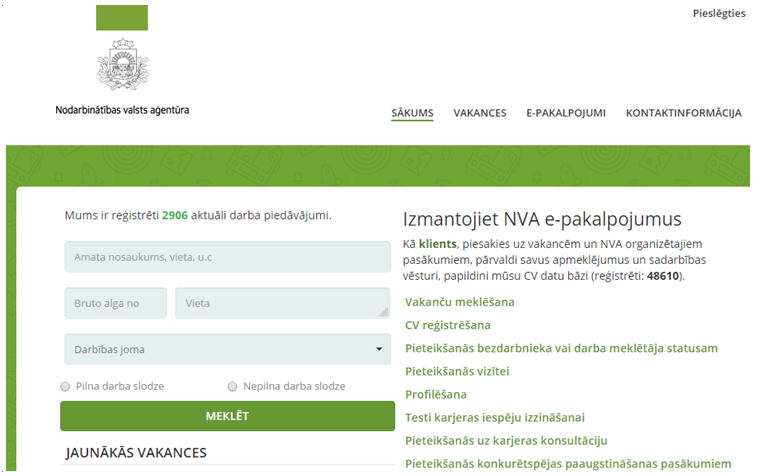Challenges Addressed
- Blended counselling
- Exchange and knowledge transfer (among educational professionals, guidance counsellors, etc.)
- Facilitation of transition from school education to career selection
- Improve matching between skills and jobs
- Improvement of guidance/ employment services
- Increase the interaction between schools and professional life
- Increase the mobility of people in Europe for education and employment purposes
- Promote self-assessment
- Provision of low-threshold information on educational guidance to disadvantaged adult populations
- Raise awareness on guidance
- Reduce early school leaving
- Support those wishing to re-enter the labour market
- Tackling unemployment
- Target unemployment
The Career Portal aims to: make clients more independent and responsible in finding a job; and ensure that clients can make more informed choices. In this way, the risk of becoming unemployed in the future can be reduced. This objective is achieved by providing support for planning one’s career, by providing job search support and by introducing labour market information. 
Registration is required for people that are entitled to receive unemployment benefits as well as for people participating to support measures such as the voucher training system.
Policy objectives
- Access to Lifelong Guidance Services
- Assessing the effectiveness of Lifelong Guidance Provision
- Assuring the quality of Lifelong Guidance Provision
- Career Management Skills
- Contributing the rise of mobility of people in Europe for education and employment purposes
- Funding Lifelong Guidance Services
- ICT in Lifelong Guidance
- Improving careers information
- Improving employability and supporting older workers
- Interactive online tools
- Raising the skills and qualifications of adults
- Raising the skills and qualifications of young people
- Strategic Leadership
- Supporting people at risk and disadvantaged groups
- Training and Qualifications of Guidance Practitioners
INNOVATIVE ASPECTS OF LMI
- Blended counselling
- Creation of ePortfolios with students' skills and competences
- Crowed sourcing of expert knowledge on educational guidance
- Customisation of LMI through the users' adaptation according to their needs
- Data entered by end-users
- Effective job matching
- Guidance methods
- Informal LMI
- Innovative user profiling
- Interoperability with job-search engines
- Life course related filtering of LMI
- Matching of regional education to labour market
- News relevant to educational guidance
- Occupational information
- One-stop-shop
- Personalised educational advice
- Provision of additional information on the awards not available elsewhere, to make it easily understood to employers and institutions in other countries
- Provision of external links to available EC employment, guidance and educational services
- Real time LMI
- Scientific research on guidance
- Thematic compilation of third party LMI
The platform offers Labour market information through:
- Online self-assessment tools;
- Database of education opportunities;
- Database of occupation descriptions;
- Labour market forecasts by sector, occupation and region;

INNOVATIVE USE OF ICT
- Combination with offline elements
- Connection with third parties (LMI, PES, etc.)
- Customized RSS feed
- Dynamic interconnection of electronic resources according to a life course approach
- e-portfolio
- Interactive online tools
- Mobile app
- Online counselling
- Online wiki
- Open source
- Personalised information storage
- Quick diagnosis tool
- Social media utilisation
- SEA services fully exploit social media while e-mail counselling is included;
- Self-service by clients: use of career tools, labour market forecasts, application for a job, create CVs add documents;
- Services for employers: employers register vacancies free of charge.

Results and impacts obtained
- In numbers, approximately 1 560 career guidance & counselling replies have been provided in 2015.
- From qualitative perspective, first, activation measures can be used more effectively, second, the use of the tools brings new information creating better insights in the skills mismatch in Latvia and third, career tools help in reducing the risk of becoming unemployed.
- Evaluation process: the evaluation system is based on informal feedback and key performance indicators measuring the performance of local offices as a whole.

- Client-centered approach;
- Learning and development approach;
- Cost efficiency approach.
- Important economic and social challenges in Latvia, such as emigration, the position of groups at risk on the labour market and informal economy. Returning emigrants can be provided with specific labour market information.
- Relatively high requirements for digital literacy.
Transferability elements
The development of the SEA portal was triggered by the big overall movement towards e-governance in Latvia. During the 1990s Latvia had career centres specialised in career education and guidance, which were later integrated into SEA, resulting to different types of counsellors: employer agents, job counsellors and career counsellors.
The portal financially depends on two main sources: European subsidy programmes for investment and development costs, and the general SEA budget for maintenance, updating and further development issues.
The career portal is developed by an information systems team and the job search support division at the central office; there are 70 career counsellors in the local offices characterised by higher education in psychology and social sciences, fluent in Latvian and Russian, ICT literacy, a client centred attitude, high ethical standards, good social skills and relevant experience.
There are four different systems behind the career portal tools at SEA level: the career part of the SEA portal, the system for self-services provided by the portal, a system running the vacancy databases and an internal system. The systems operated by SEA are connected to other national databases.
- Regular training available for career counsellors;
- Face-to-face career guidance and job counselling complemented with contact by telephone;
- Several stakeholders engaged in the development of the career portal and the labour market information.
- Continuous improvement process pursued by SEA;
- Integration of short term, midterm and long-term forecasts in the labour market forecast tool;
- Improvement of the integration of educational information;
- Make the portal more comprehensive;
- Continue to use social media in order to provide general information about its services.
